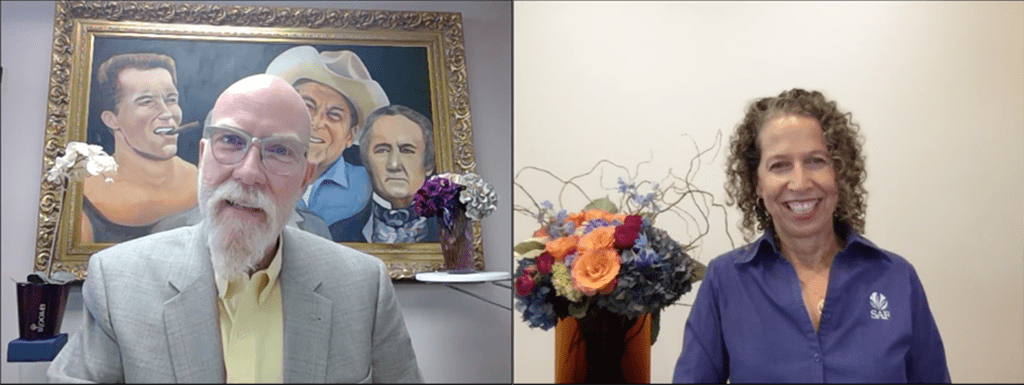
Joe Don Zetzsche, director of H-E-B’s BLOOMS Flower Shops, and Kate Penn, CEO of the Society of American Florists.
For the final keynote presentation of the Society of American Florists’ Reinvention Summit last week, SAF CEO Kate Penn interviewed Joe Don Zetzche, director of BLOOMS flower shops for H-E-B, a Texas-based supermarket chain that Forbes dubbed “the smartest retailer you’ve never heard of.” In their conversation, “Leadership in Times of Crisis,” the pair discussed how to assemble and nurture a team that’s emotionally invested in your business and eager to work together to overcome challenges.
“Our secret sauce is our partners, which is what we call our employees,” Zetsche said. “We treat them as our equals.” Partners’ safety and happiness comes first, and their wellbeing trickles down to outstanding workmanship and service, he explained. “There have been times in my career that I’ve told a customer, ‘I appreciate you as a person, but I request that you not come back here.’ They’d been rude to one of our partners and we can’t tolerate that.”
It’s easy for H-E-B leaders to have their partners’ backs because team members have been selected for their people skills and extensively trained to “do the right thing.” “We trust their judgment and respect them completely,” Zetsche said. “Even in situations where it doesn’t work out and we have to part ways, people leave the company with dignity.”
Here are a few H-E-B leadership tactics that help the company succeed:
Embrace transparency. H-E-B is exceptionally candid with the entire team. “We are open with our partners about every aspect of our business, including financial matters, and we share information very deeply,” Zetzche said. “Everyone — designers, salespeople, delivery drivers, custodians — understands the levers they pull that affect profitability.” The company trusts that its people will protect sensitive information and will keep it in mind when they’re tempted to cut a corner or “just add another stem or two” to an arrangement. Additionally, this upfront approach helps soften the blow during difficult situations, like layoffs, furloughs and reduced hours. “If your employees know your business, there’s no surprise blow coming,” he said. “They know there’s not all this income coming in — that you’re not making decisions capriciously, but out of necessity.”
Promote your purpose. It’s easier to retain employees when they feel their job has meaning beyond simply paying the bills. “Having a sense of history is one way to accomplish this,” Zetzche said. He tells all new hires how, in 1905, a mother whose husband was ill needed a way to provide for her family and established a cash-and-carry grocery store, and how that company has since navigated world wars, the Great Depression, inflation and huge shifts in the industry. “This story binds us together,” he said. “It’s important to discuss the emotions that went into creating the business.” H-E-B also eschews a common business school mantra: that corporations exist to make maximum profit for shareholders. “Yes, we want to be the greatest and be profitable,” he said. “But that’s so we can take care of our communities — to offer the best pay, benefits and career opportunities for our partners.”
Hire for personality, not skills. H-E-B recognizes the opportunity of taking young people who don’t have a trade or education and growing them up. “They need to genuinely care about people,” Zetzche said. “You can train the other pieces.” Several members of his team participate in the interview process to help him avoid his biases and to ask questions he might not have considered. When they narrow the field down to their top two candidates, he asks his peers who they think best fits their company culture. “We might go with the person who has a less deep resume if we feel they will gel with us,” he said.
Prioritize processes. H-E-B doesn’t wing anything. Hiring, employee training and reviewing errors are just a few areas of the business with detailed processes in place. For instance, every design includes a visual training aid — a picture with step-by-step instruction or a video demonstration. These guides emphasize the basics, such as starting with clean water in a clean vase, adding flower food and making sure clippers have been sanitized. “It’s not the creativity that draws most of us into this industry, but these are important steps,” he said. When addressing mistakes, Zetzche first hugs the person who messed up and makes sure they’re okay. Then, they work backwards to identify where the math or communication got jumbled. Together, they come up with a new safety check to prevent it from happening again. “Without processes, you’re just running from season to season, from fire to fire,” Zetzche said. “You don’t have the backbone to help you deal with issues more easily.”
Celebrate successes and good deeds. H-E-B used to be very quiet about the company’s philanthropic activities, but now leaders speak openly with the team about endowments and gifts, so everyone knows what they helped create to better their community. “You can toot your own horn in a non-prideful way,” Zetzche said. Additionally, they share examples of partners who go above and beyond for customers. “When you learn of someone doing something out of the ordinary because their gut says it’s the right thing to do, you need to share those stories,” he said.
Katie Hendrick Vincent is the senior contributing writer and editor for the Society of American Florists.

